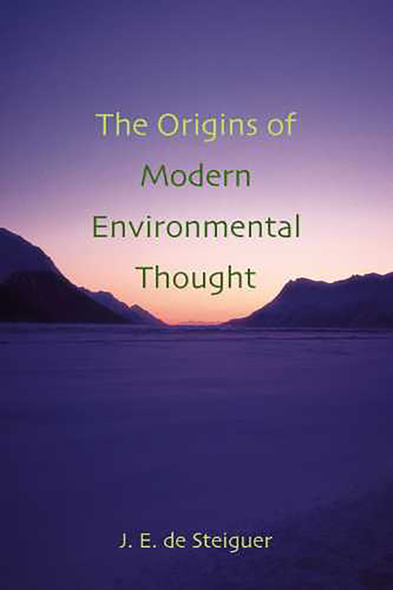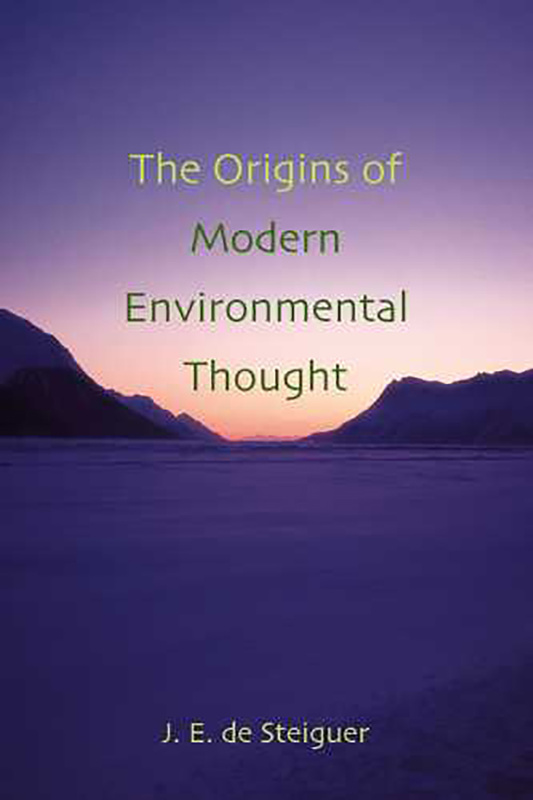The Origins of Modern Environmental Thought
The University of Arizona Press
The Origins of Modern Environmental Thought provides readers with a concise and lively introduction to the seminal thinkers who created the modern environmental movement and inspired activism and policy change. Beginning with a brief overview of the works of Thoreau, Mill, Malthus, Leopold, and others, de Steiguer examines some of the earliest philosophies that underlie the field. He then describes major socioeconomic factors in post–World War II America that created the milieu in which the modern environmental movement began, with the publication of Rachel Carson’s Silent Spring. The following chapters offer summaries and critical reviews of landmark works by scholars who helped shape and define modern environmentalism.
Among others, de Steiguer examines works by Barry Commoner, Paul Ehrlich, Kenneth Boulding, Garrett Hardin, Herman Daly, and Arne Naess. He describes the growth of the environmental movement from 1962 to 1973 and explains a number of factors that led to a decline in environmental interest during the mid-1970s. He then reveals changes in environmental awareness in the 1980s and concludes with commentary on the movement through 2004. Updated and revised from The Age of Environmentalism, this expanded edition includes three new chapters on Stewart Udall, Roderick Nash, and E. F. Schumacher, as well as a new concluding chapter, bibliography, and updated material throughout. This primer on the history and development of environmental consciousness and the many modern scholars who have shaped the movement will be useful to students in all branches of environmental studies and philosophy, as well as biology, economics, and physics.
Among others, de Steiguer examines works by Barry Commoner, Paul Ehrlich, Kenneth Boulding, Garrett Hardin, Herman Daly, and Arne Naess. He describes the growth of the environmental movement from 1962 to 1973 and explains a number of factors that led to a decline in environmental interest during the mid-1970s. He then reveals changes in environmental awareness in the 1980s and concludes with commentary on the movement through 2004. Updated and revised from The Age of Environmentalism, this expanded edition includes three new chapters on Stewart Udall, Roderick Nash, and E. F. Schumacher, as well as a new concluding chapter, bibliography, and updated material throughout. This primer on the history and development of environmental consciousness and the many modern scholars who have shaped the movement will be useful to students in all branches of environmental studies and philosophy, as well as biology, economics, and physics.
J. Edward (“Ed”) de Steiguer is a writer and professor at the University of Arizona. He specializes in the federal lands of the American West and is an avid horse enthusiast himself. He is also the author of The Age of Environmentalism and The Origins of Modern Environmental Thought, the latter published by the University of Arizona Press.
1 Foundations of Environmental Thought
2 Post–World War II Socioeconomic Conditions
3 Rachel Carson’s Silent Spring
4 Harold Barnett and Chandler Morse’s Scarcity and Growth
5 Stewart L. Udall and The Quiet Crisis
6 Roderick Nash’s Wilderness and the American Mind
7 A. C. Pigou, Ronald Coase, and the Development of Environmental Economics
8 Kenneth Boulding and Spaceship Earth
9 Lynn White and ‘‘The Historical Roots of Our Ecologic Crisis’’
10 Paul Ehrlich and The Population Bomb
11 Garrett Hardin and ‘‘The Tragedy of the Commons’’
12 Barry Commoner and The Closing Circle
13 Herman Daly and the Steady-State Economy
14 The mit Team and The Limits to Growth
15 E. F. Schumacher’s Small Is Beautiful
16 Arne Naess and the Deep Ecology Movement
17 Beyond the Age of the Environmental Philosophers
Notes
Bibliography
Index






